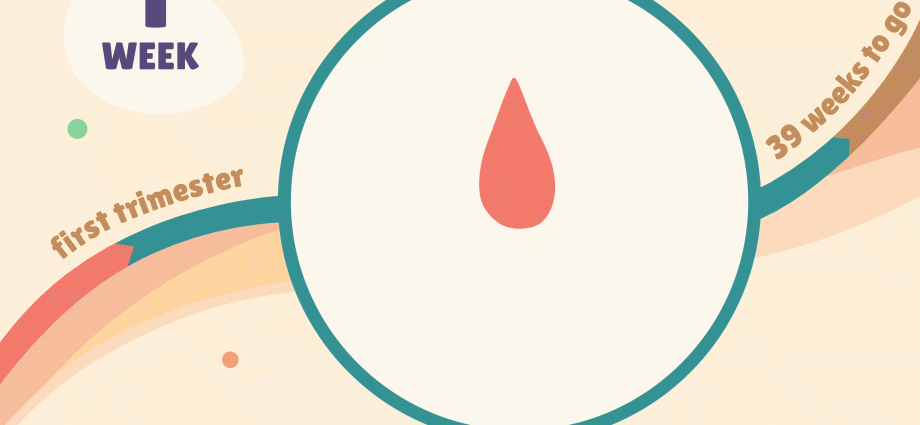Contents
- First signs of pregnancy – 1 week
- How to check pregnancy at 1 week
- What sensations can you experience in 1 week
- What to do if you become pregnant
- 1 week: what happens in a woman’s body
- Feelings of a woman and signs of pregnancy at 1 obstetric week
- Signs of pregnancy
- 1 week: what happens to the fetus, pregnancy diagnostics
- Useful tips and tricks
- Popular questions and answers
The third week of the obstetric term, also known as the 1st week of pregnancy after conception, is a magical time when the unborn baby is just beginning to take shape. What does his mother feel at this time?
First signs of pregnancy – 1 week
Expectant mothers immediately need to remember that there are two views on the duration of pregnancy: obstetric and embryonic. We are talking about 1 week of pregnancy after conception, that is, about the embryonic period. Doctors usually operate in obstetrics, where the last day of menstruation is taken as the starting point. To get obstetric from the embryonic period, you need to add two weeks. That is, the first week of pregnancy after conception corresponds to the third obstetric week.
At this time, the restructuring of the woman’s body has just begun. Very few people notice the first signs of pregnancy during this period.
https://www.youtube.com/watch?v=1S34py59X64
“Some women may feel pregnant even in the first week after conception, but these are usually few,” the doctor explains. obstetrician-gynecologist Dina Absalyamova. – I tend to believe that more of a psychological factor plays a role here, although the pregnancy hormone – human chorionic gonadotropin (hCG) can also have an influence. It is produced by a fertilized egg.
Sensitive women may notice that their mood and taste preferences are changing. Among the signs of pregnancy in the first week, some even note toxicosis, but usually it appears after a couple of weeks.
Photo of the stomach

In the first week of pregnancy (from conception), the figure remains the same. The fetus is still too small for the belly to become visible. The zygote, formed by the egg and sperm, divides quickly, but not enough: into 2 cells, 4, 8, and so on up to 32 cells. Accordingly, a photo of the abdomen at 1 week of pregnancy is not indicative.
The fetus in the first week of pregnancy is called an embryo, it actually becomes a fetus only in the sixth week.
While the embryo is in a small sac with liquid and is not fed from the mother, but from the yolk sac. The size of the future baby at this time is approximately 0,1–0,2 mm. Given how small it is, no one can guess the interesting position of a woman from a photo of the abdomen at 1 week of pregnancy.
How to check pregnancy at 1 week
It is almost impossible to check pregnancy at 1 week. Changes in the body are too small for tests or an ultrasound machine to detect them. To get convincing evidence that you are in a position, you need to wait at least the 7th, and preferably the 10th day of pregnancy, when especially sensitive tests can already show the coveted two strips.
Tests
A test in the first week of pregnancy will either give nothing or show a dubious result. Too little time has passed since conception for changes to become noticeable.
“If you pass a regular pharmacy test in the first week of pregnancy, where you need to urinate on a strip, it will certainly show a negative result – the period is too short,” explains gynecologist Dina Absalyamova. – The same problem will be with the analysis for hCG. Fluctuations in the level of human chorionic gonadotropin are so insignificant that the results will be regarded as doubtful.
It turns out that the expectant mother can only wait until the gestational age exceeds 10 days and the tests become more reliable.
Ultrasound
Do not rush to run for ultrasound diagnostics. In the first week of pregnancy, ultrasound is not indicative, even the most modern equipment is not able to visualize the fetus.
As a rule, ultrasound at such an early date is recommended for those women who have symptoms specific to an ectopic pregnancy. It can be dangerous, therefore, to exclude such a diagnosis, a gynecologist may prescribe an ultrasound diagnosis.
Those girls who hope to get the first pictures of their unborn child will have to wait until 2-3 weeks.
What sensations can you experience in 1 week
– During the first week of pregnancy, the mother feels good and rarely notices that something has changed in her body. There are especially sensitive women who, already on the 3rd-4th day of pregnancy, notice that their mood and taste preferences are changing: they suddenly start eating foods that they did not like before, or vice versa, they give up their previous preferences. Some at such an early date even begin toxicosis, but there are very few such women, explains obstetrician-gynecologist Dina Absalyamova.
Most of the sensations that a woman may experience at 1 week of pregnancy are similar to those that usually precede critical days. For example, characteristic pains in the lower abdomen, and about a week before the start of the cycle.
Some girls in position note that their breasts become more sensitive, even painful. In some, the pigmentation of the nipples increases and freckles appear. In general, the signs of pregnancy at 1 week are almost invisible.
Monthly
Since conception occurs in the middle of the menstrual cycle – about 13-14 days in a standard 28-day cycle – a woman may not suspect that she is pregnant. Monthly something still ahead. The first week of pregnancy after conception ends at about 21-25 days, so there is no need to talk about menstruation and delay yet.
When the time comes, and menstruation has not appeared, it will become clear that the woman is expecting a baby.
Stomach ache

This is a deceptive sign of early pregnancy. Many women experience pain before critical days, so they do not attach importance to discomfort in the middle and second half of the cycle. However, future mothers often note that it was the pain in the lower abdomen that became the first sign of pregnancy for them. They are usually felt 5-7 days before the cycle, that is, at the end of the first week of pregnancy.
However, pain can also be caused by other causes, for example, intestinal dysbacteriosis or a violation of its functions. Often, pain in the pelvis provokes the spine. For example, with osteochondrosis, pain can be given just to the area in the lower abdomen. They may also be associated with pelvic adhesions from previous gynecological surgeries or caesarean sections.
Usually pain in the lower abdomen is considered as a possible symptom of an ectopic pregnancy, when a fertilized egg is attached not in the uterine cavity, but in the fallopian tube, cervix or on the ovary. However, in the first week of pregnancy, there may not be any discomfort. More often they occur as the embryo grows, by 3-4 weeks.
What to do if you become pregnant
For starters: do not be nervous and make an appointment with a doctor. Whether it is a desired pregnancy or an unplanned one, a trip to the gynecologist is essential. The doctor will register you, give recommendations on the tests that will need to be taken in the near future, prescribe vitamins and write out an action plan for all 9 months.
Sometimes there is no opportunity to go to the gynecologist for an examination, then remember a few simple rules and try to follow them until the next visit to the doctor.
In the first week of pregnancy, do not drink alcohol, avoid antibiotics, avoid hot baths and stress, do not lift weights and try to give up cigarettes and the society of people who smoke. Take care of your health: even catching a cold at such an early date is undesirable.
Try to relax more, walk in the fresh air, strengthen your immune system and do things that give you pleasure.
1 week: what happens in a woman’s body

Good to know
When planning a pregnancy, pay attention to the following interesting point. Spermatozoa, which are carriers of the “girl” chromosome, are quite tenacious: they can wait for an egg up to 7 days. Spermatozoa-“boys” live not so long – from several hours to 1-2 days. If you want to try to conceive a girl, it’s worth trying somewhere three or more days before ovulation. If a boy, the day of conception should fall directly on the period of ovulation.
Feelings of a woman and signs of pregnancy at 1 obstetric week

Good to know
Often during menstruation, a woman’s lower abdomen hurts so much that she is forced to take painkillers. If a couple is planning a pregnancy in this cycle, it is better for the expectant mother to refuse such pills.
When should you consult a specialist? For example, if during menstruation the stomach hurts so much that a woman loses her ability to work. If the pain is continuously tormenting for more than two days, the discharge has become very profuse and does not stop even on the 5th or 7th day of menstruation.
Signs of pregnancy
1 week: what happens to the fetus, pregnancy diagnostics
Useful tips and tricks
Popular questions and answers
What needs to be changed in your life from the first week of pregnancy?
At the same time, the body begins to rebuild, so a pregnant woman may feel symptoms that are easily confused with PMS: drowsiness, weakness, slight heaviness and pulling pains in the lower abdomen. Sometimes – a change in taste preferences. Usually this is not given importance.
If a woman planned a pregnancy and hopes for its onset, then it is worth excluding smoking, alcohol, heavy physical exertion and weight lifting. From the very beginning of pregnancy, the expectant mother needs to eat right and drink plenty of water, walk more often and breathe fresh air, limit stress, engage in your favorite hobbies and relax more.
What should I do if I accidentally drank alcohol in the first week of pregnancy?
If a woman drank “accidentally” and once in a small amount (for example, a glass of wine), most likely, this will not cause significant harm. A more dangerous threat is taking medications at the very beginning of pregnancy. They can harm the development of the fetus. Therefore, a woman should consult a geneticist if she took medication at the beginning of pregnancy.
Is it necessary to use protection in the first week of pregnancy?
But you need to understand: such cases rarely occur. Therefore, there is no need for contraception after pregnancy. The exception is if a woman continues to have sex with different partners. In this case, she needs to use condoms so that harmful bacteria (causative agents of STDs) do not enter the body. They can cause complications in the development of the fetus.
If STDs are detected during the examination during pregnancy in the PCR analysis, they must be treated after 12 weeks to avoid infection of the fetus.











Чооң ырахмат!